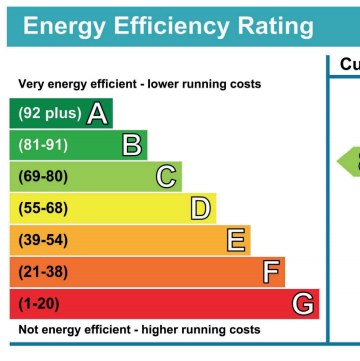
Minimum Energy Efficiency Standards (MEES)
The Domestic Minimum Energy Efficiency Standard (MEES) Regulations came into effect in April 2018. It set a minimum energy efficiency level for private rented properties in England and Wales. Properties in England and Wales must be rated “E” or higher to be privately let and those with ratings “F” and “G” must be brought up to standard before the deadline. This rating is found on a valid Energy Performance Certificate (EPC).
An Energy Performance Certificate (EPC) can only be issued by a qualified Domestic Energy Assessor and each certificate is logged and accessible on a national register. They last for 10 years and the same certificate can be used for multiple tenancies with different tenants.
If a property does not meet the minimum standard of an E rating, it must not be let to a new tenant after 1 April 2018 until it is reassessed with an E or higher rating. If the tenancy period has already begun but it started before 1 April 2018, the landlord must improve the property rating to E or higher by 1 April 2020.
An “A” rating indicates that a property achieved the highest level of energy efficiency, and a “G” rating signifies the lowest level of energy efficiency. Apart from a rating, a certificate also shows a building’s carbon dioxide emissions, which can be affected by a building’s walls, flooring, roof insulation, boilers and more. These are all factors an assessor will look at when assessing the EPC rating of a property. Note that if your property has an EPC done within 10 years, but a newer EPC was done more recently, the rating on the more recent EPC prevails.
There are exemptions to the MEES rules, but they have to be regularly assessed, and they expire after 6 months or 5 years, depending on which exemption is applied for. You would however need a valid EPC to apply for an exemption. In some cases, surveyors or architects may need to be hired and it is usually more cost-effective to improve a property’s energy efficiency rating than to apply for an exemption.
Related Posts
Covid-19 guidance remains
From Monday 29 March, the UK Government started to ease lockdown restrictions on...
Right to Rent checks continue remotely
The Home Office has today announced that Adjusted arrangements allowing Right to...
Changes to right to rent checks from 1st July 2021
A draft revised Right to Rent Code of Practice has been issued by The Home Office...
Smart Meter Awareness Week
Spearheaded by Smart Energy GB, the UK Government-backed campaign body, the...




